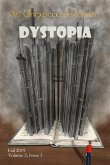Much has been written about the "long Sixties," the era of the late 1950s through the early 1970s. It was a period of major social change, most graphically illustrated by the emergence of liberatory and resistance movements focused on inequalities of class, race, gender, sexuality, and beyond, whose challenge represented a major shock to the political and social status quo. With its focus on speculation, alternate worlds and the future, science fiction became an ideal vessel for this upsurge of radical protest.
Dangerous Visions and New Worlds: Radical Science Fiction, 1950 to 1985 details, celebrates, and evaluates how science fiction novels and authors depicted, interacted with, and were inspired by these cultural and political movements in America and Great Britain. It starts with progressive authors who rose to prominence in the conservative 1950s, challenging the so-called Golden Age of science fiction and its linear narratives of technological breakthroughs and space-conquering male heroes. The book then moves through the 1960s, when writers, including those in what has been termed the New Wave, shattered existing writing conventions and incorporated contemporary themes such as modern mass media culture, corporate control, growing state surveillance, the Vietnam War, and rising currents of counterculture, ecological awareness, feminism, sexual liberation, and Black Power. The 1970s, when the genre reflected the end of various dreams of the long Sixties and the faltering of the postwar boom, is also explored along with the first half of the 1980s, which gave rise to new subgenres, such as cyberpunk.
Dangerous Visions and New Worlds contains over twenty chapters written by contemporary authors and critics, and hundreds of full-color cover images, including thirteen thematically organised cover selections. New perspectives on key novels and authors, such as Octavia Butler, Ursula K. Le Guin, Philip K. Dick, John Wyndham, Samuel Delany, J.G. Ballard, John Brunner, Judith Merril, Barry Malzberg, Joanna Russ, and many others are presented alongside excavations of topics, works, and writers who have been largely forgotten or undeservedly ignored.
Dangerous Visions and New Worlds: Radical Science Fiction, 1950 to 1985 details, celebrates, and evaluates how science fiction novels and authors depicted, interacted with, and were inspired by these cultural and political movements in America and Great Britain. It starts with progressive authors who rose to prominence in the conservative 1950s, challenging the so-called Golden Age of science fiction and its linear narratives of technological breakthroughs and space-conquering male heroes. The book then moves through the 1960s, when writers, including those in what has been termed the New Wave, shattered existing writing conventions and incorporated contemporary themes such as modern mass media culture, corporate control, growing state surveillance, the Vietnam War, and rising currents of counterculture, ecological awareness, feminism, sexual liberation, and Black Power. The 1970s, when the genre reflected the end of various dreams of the long Sixties and the faltering of the postwar boom, is also explored along with the first half of the 1980s, which gave rise to new subgenres, such as cyberpunk.
Dangerous Visions and New Worlds contains over twenty chapters written by contemporary authors and critics, and hundreds of full-color cover images, including thirteen thematically organised cover selections. New perspectives on key novels and authors, such as Octavia Butler, Ursula K. Le Guin, Philip K. Dick, John Wyndham, Samuel Delany, J.G. Ballard, John Brunner, Judith Merril, Barry Malzberg, Joanna Russ, and many others are presented alongside excavations of topics, works, and writers who have been largely forgotten or undeservedly ignored.
Dieser Download kann aus rechtlichen Gründen nur mit Rechnungsadresse in A, D ausgeliefert werden.
"Dangerous Visions and New Worlds offers a birds eye view of a period when we were most passionate-about literature, the arts and the sciences, and when we let the rockets explore the universe while we turned to explore the multiverse in terms of the human psyche. Powered by a faith that fiction-especially speculative fiction-could change the world-the New Wave allied with the Underground Press, the Left and the world of rock and roll to create a cultural explosion. This book recalls the highly individualistic writers, with often radically different approaches."
-Michael Moorcock
"Critics and general readers of science fiction have been struggling to define, assess, and in some cases, dismiss the New Wave era in science fiction since its inception. This entertaining volume offers a fresh, twenty-first century reappraisal of the major New Wave SF authors along with a concise history of the movement's significant publications. Then, additional essays diversify the discussion to include other less well-known, progressive authors, and wide-ranging historical topics, effectively placing the New Wave in a broader radical context. An excellent introduction to the ground-breaking SF of the period, and an insightful critique of its continuing impact. And having all the vintage covers in one place is very cool."
-Allan Kausch, original Lucasfilm Star Wars continuity editor, pre-production editor of The Selected Letters of Philip K. Dick, co-editor of Michael Moorcock's London Peculiar and Other Nonfiction
-Michael Moorcock
"Critics and general readers of science fiction have been struggling to define, assess, and in some cases, dismiss the New Wave era in science fiction since its inception. This entertaining volume offers a fresh, twenty-first century reappraisal of the major New Wave SF authors along with a concise history of the movement's significant publications. Then, additional essays diversify the discussion to include other less well-known, progressive authors, and wide-ranging historical topics, effectively placing the New Wave in a broader radical context. An excellent introduction to the ground-breaking SF of the period, and an insightful critique of its continuing impact. And having all the vintage covers in one place is very cool."
-Allan Kausch, original Lucasfilm Star Wars continuity editor, pre-production editor of The Selected Letters of Philip K. Dick, co-editor of Michael Moorcock's London Peculiar and Other Nonfiction









